Cori L. Sanders did a splendid job coordinating a team of volunteers at the recent WORD Christchurch Writers and Readers Festival. Here she interviews WORD's literary director Rachael King.
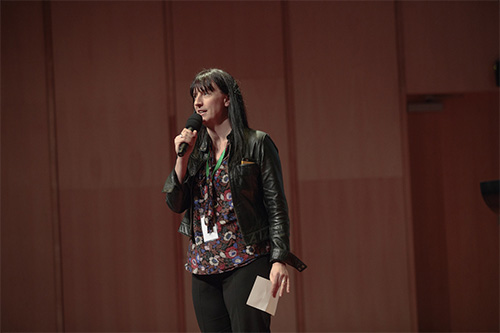
Congratulations on the amazing success of the recent WORD Christchurch Writers and Readers Festival. Putting together a literary festival seems a massive undertaking. How long did it take you to plan and execute?
Each festival takes a year to plan, although some foundation work is done in the preceding year as well. This year we had a fantastic and very hard working team led by Executive Director Marianne Hargreaves. My job is to plan what the festival will look like - everyone else makes it happen!
The festival featured 80 events and over 150 writers and speakers. How did you put the programme together? Or to reprise the title of one of the festival events: Where do you get your ideas from? (Did you brainstorm with a committee or were these ideas all your own?)
I do call for input of ideas from our board of trustees, who are all avid readers, and from my Twitter followers who are a clued-up bunch, but mostly the ideas come from reading books, reading coverage of books on the internet, checking upcoming publishing schedules (and publishers sometimes pitch their authors to me), and generally thinking about the issues and themes that the world is concerned with. What moves people? What troubles them? What do they want to know more about?
Outside of my work hours I am constantly thinking about the programme and can get lost for days down the rabbit hole of the internet following ideas. We also work closely with the Melbourne and Brisbane Writers’ Festivals as well as Sydney’s Festival of Dangerous Ideas, so we send each other ideas.
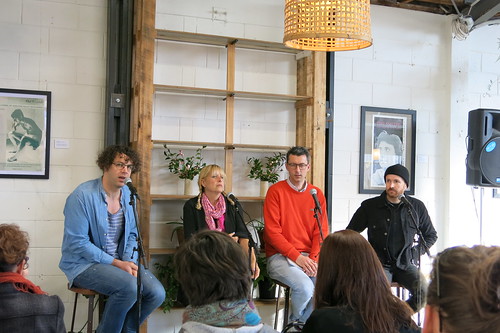
How did you hear about these various authors/speakers, and how did you decide which ones to invite over?
All different ways, but here are some examples. The Canadian writers (Ivan Coyote, Elizabeth Hay and Sheila Watt-Cloutier) came to me through Hal Wake, the director of the Vancouver Writers Festival, which I attended in October last year. I saw that Tim Flannery had a book out on climate change, which was a topic I wanted to cover; his partner Kate Holden came highly recommended to me by another writer.
I found Caitlin Doughty via Twitter, where she was tweeting macabre things that appealed to me, which led me to her website where to my delight I discovered she had recently published a book. Then I saw her speak at the Sydney Writers’ Festival last year and that sealed the deal. Ali Cobby Eckermann and Elisa Washuta came through the Christchurch Sister Cities programme - both writers were recommended to me by literary people in Adelaide and Seattle respectively.
Alok Jha was recommended to me by someone who had seen him in person in the UK. John Freeman I met in Auckland last year, then again in Vancouver and New York. He was coming out for the Melbourne Writers Festival so I extended the invitation to Christchurch.
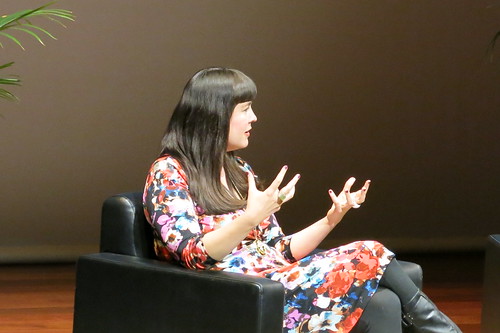
Did you start with a theme in mind or did the theme emerge later?
You send out hundreds of invitations and hope that some will stick. In this case, the ones that were sticking started revolving around two common themes - the planet and its people. Nearly all the writers who had accepted my invitation write about quite political things, whether it is the environment, gender, human rights, sexual politics, life and death. I decided to declare the Planet & its People as the official theme because I knew it would appeal to people who care about what is happening in the world right now.
The festival ranged over a myriad of topics like climate change, water, feminism, sex, positive death-acceptance, true crime, LGBT issues, poetry, migrants’ voices, war stories, inclusive cities, and political cartoons. How did you know what topics would appeal to a general audience? What combination and balance were you looking to achieve?
These are topics that engaged people care about. I was looking for a combination and balance of thought-provoking, challenging, enlightening, uplifting and entertaining.
Do your literary interests span all these different genres, topics, and cultural hot buttons? Did you read all the books featured?
I wish I could say I read books by all 150 speakers at the festival but alas no, I didn’t have the time! My personal tastes run to literary fiction and personal essays mostly, but I can still appreciate a topic and trust my sources, and I always make sure the speaker is engaging foremost.
You’ll notice I managed to smuggle my musical tastes in there as well, with the Flying Nun celebration night and Hollie Fullbrook from Tiny Ruins, and also included comics, performance poetry, live storytelling, journalism and TV writing, so WORD is no longer just about books.
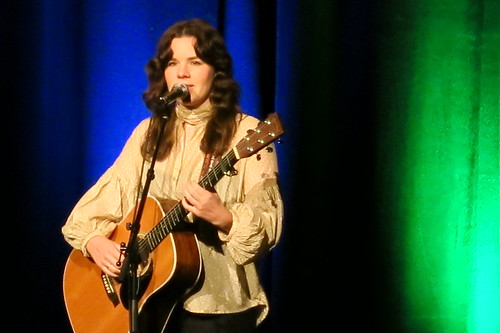
Some authors were interviewed on stage; others took to the stage by themselves; and yet others were part of a panel. How did you decide which format would best showcase each author’s talents?
A lot of it was led by the writers themselves. It is a big ask to get someone to prepare an address, so many authors prefer the ‘in conversation’ format. It is good to have a mixture of both, so I always ask which format the writers prefer.
Panels are a good way to make sure an international author has more than one opportunity to be on stage; and with local writers, they are a good way to include as many writers as possible, and to cover some interesting topics beyond ‘tell us about your book’.
How did you decide who would chair each panel or interview each author?
I attend a lot of writers’ festivals and am always paying close attention to the chairs! In many cases a good chair person is as important as the speaker people have come to see. Chairing takes a certain set of skills - confidence to carry the responsibility, but also the confidence to take a back seat and not dominate.
Chairing a panel is a kind of mediation as well, where it’s essential that you allow everyone on the panel to get their word across, and be prepared for conflict. Managing audience questions is another skill! I also look for chairs who can go with the flow of conversation rather than rigidly over prepare and stick to their questions no matter what. As far as who to match with whom: instinct.
What guided your decision-making regarding workshop topics and the people who would run them?
I wanted a range of topics, and we certainly had that: fiction, song-writing, the business of publishing, memoir, indigenous storytelling. They arose from looking at who was coming and who had experience teaching. The workshops were all very popular, so we will definitely look at adding more next time - and as Tracy Farr’s fiction workshop and Scott Pack’s How to Perfect Your Submission workshop sold out so quickly, will look at more fiction workshops next time and another about getting published. The Taku Kupu Ki Te Ao workshop had three teachers in addition to the facilitator, and by all accounts they got as much out of it as the students!
What gave you the idea to launch the immensely successful new events like Oratory on the Ōtākaro, and the New Regent Pop-Up Festival?
The Ōtākaro walk was conceived in consultation with Ngāi Tahu who are a great supporter of the festival. We are keen to regularly feature Ngāi Tahu speakers and stories. Look out for more walks at future festivals!
The Pop-Up was inspired by a combination of things - wanting to expand the fringe programme which creates accessible events in interesting spaces; wanting to include as many Christchurch writers in the programme as we could; and my visit to the Lit Crawls in Seattle and San Francisco last year. The organisers are keen for us to become part of the Lit Crawl family but there is already a LitCrawl (note different spelling!) in Wellington and we don’t want to detract from that. But the New Regent Street space was an excellent way to test the waters for this kind of event, and I hope it will become a regular feature of future festivals. It added so much character to the festival.
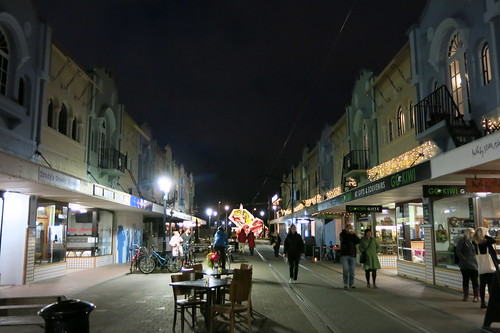
Any kinks you want to iron out for next festival or any things you want to redress?
Yes, but I’m keeping those to myself as they kinks mostly happened behind the scenes and we need to maintain the image of a swan gliding across a still lake while its legs work furiously below the surface!
What were the personal highlights of this festival for you?
Oh, so many! I’m not supposed to have favourites, and as I was behind the scenes, I missed much of the festival. But I will say I was pretty proud to have Ivan Coyote and Caitlin Doughty, and the Hear My Voice event and Flying Nun event gave me goosebumps. I thought the Stars are on Fire showcase went perfectly (but I am biased), and hearing Tiny Ruins debut a beautiful new song just about had me in tears!
What are the perks of being the festival’s literary director?
Meeting interesting writers! Championing books, especially New Zealand books. Getting to travel to other festivals and to collaborate with them as well. I get a lot of free books, which is a big bonus of course.
What ideas have already sparked for the next festival?
As it’s two years away, I’ll be reissuing invitations to some people who couldn’t make it this time around. But look out! We have an amazing line-up in the planning for our Autumn Season in May, in partnership with Auckland Writers Festival, and will also have a programme of events within the Christchurch Arts Festival next year.
What do you do when you’re not planning literary festivals?
I should be writing books! But the festival takes up too much of my headspace at the moment, so I’ll say I like walking and reading, spending time with my kids. And I have recently taken up horse-riding after a 25 year gap, so that is my current obsession.
Thank you very much, Rachael, for your time, and congratulations once again on the success of the festival!
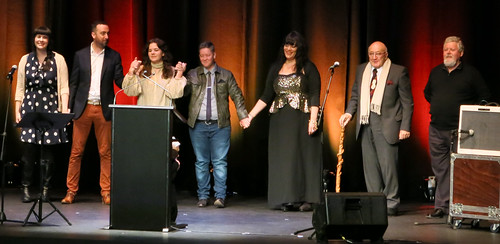
Read more of the libraries' WORD 2016 coverage.
Photos from WORD Christchurch Writers and Readers Festival 2016.




Add a comment to: After WORD – an interview with Rachael King, literary director of WORD Christchurch